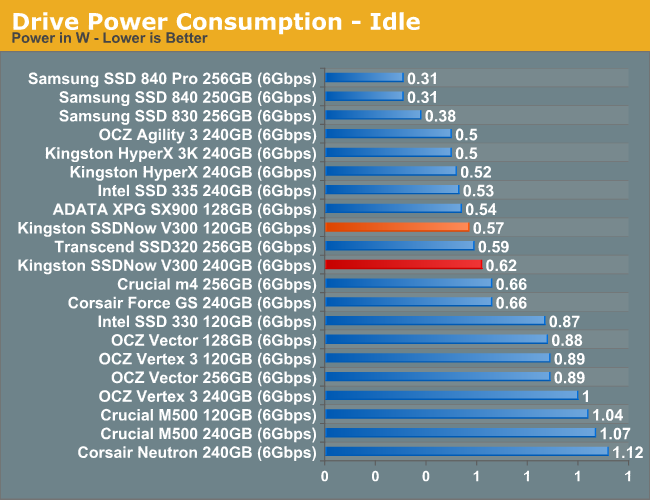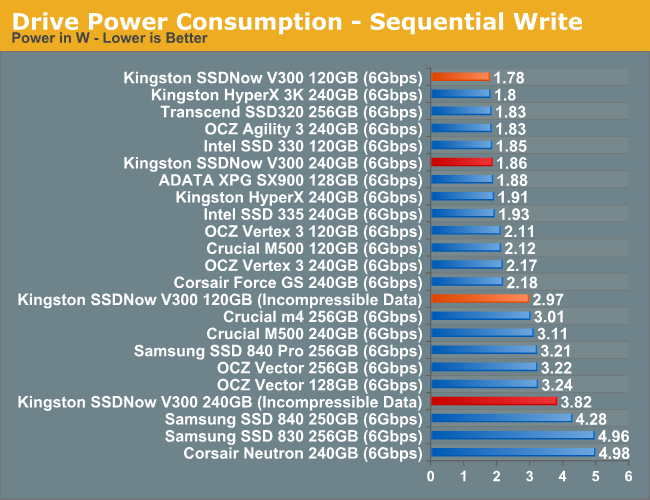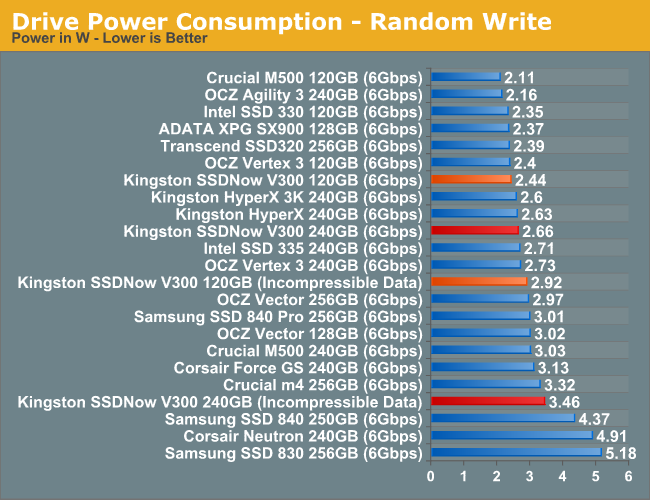Kingston SSDNow V300 (120GB & 240GB) Review
by Kristian Vättö on April 30, 2013 12:30 PM ESTTRIM Performance
SandForce has always had trouble with TRIM. SandForce's approach of compressing data on the fly definitely complicates things and I believe it's at least partially the reason why TRIM behaves the way it does in SandForce based SSDs. Even though TRIM doesn't work perfectly in any SandForce SSD, there are differences between drives and some do better than others.
As usual, I took a 240GB V300, secure erased it, filled it with incompressible sequential data and then tortured the drive with incompressible 4KB random writes (QD=32, LBA space 100%) for 60 minutes. I then ran AS-SSD after the torture to get dirty-state performance. Finally I TRIM'ed the drive and reran AS-SSD.
| Kingston SSDNow V300 Resiliency - AS-SSD | |||
| Clean | After Torture | After TRIM | |
| Kingston SSDNow V300 240GB | 278.2MB/s | 204.7MB/s | 257.6MB/s |
And the issue still persists. For the most part, this isn't a big issue because the majority of users won't store just incompressible data in their SSD (e.g. Windows is very compressible) but if you know you'll be storing lots of incompressible data (H.264 videos, MP3s or encrypted data), then going with something non-SandForce is a better option.
Power Consumption
In terms of power consumption, the V300 does pretty well. It doesn't break any records but for example Corsair's Force GS draws more power in all of our tests. The utilization of smaller process node NAND (19nm versus 24nm) does have some impact but I wouldn't be surprised if Kingston's customization also has something to do with the lower power draw.













43 Comments
View All Comments
blackmagnum - Tuesday, April 30, 2013 - link
Kingston have the brand image to succeed in this market but their product lack the unique selling point. They are just commodities like their ram sticks.Kristian Vättö - Tuesday, April 30, 2013 - link
Which is exactly the point I was trying to raise. Kingston has a decent image and their distribution system is broad but their products are not unique. They shouldn't have a problem surviving in the market but they won't be able to grab any major marketshare either.UltraTech79 - Tuesday, April 30, 2013 - link
I don't think their goal is to grab major market share. Its to maintain and secure their current market share.Diagrafeas - Tuesday, April 30, 2013 - link
Which firmware did the drives have?I bought two 120GB ones a week apart.
The first has 505 and the second 506.
The 506 is way slower...even at booting Windows.
I'll post some numbers later...
Kristian Vättö - Tuesday, April 30, 2013 - link
The 120GB I have is 505. I don't have the 240GB anymore but I'm pretty confident it's 505 too as I received it a couple of months ago so it's not exactly new.Diagrafeas - Thursday, May 2, 2013 - link
Both are on SATA 2AS SSD Benchmark Scores 505-506(Read,Write)
Seq256-175 , 158-133
4K 14-11 , 45-26
4K-64
Diagrafeas - Thursday, May 2, 2013 - link
4K-64 123-91 , 109-114Acc. Time 0.138-0.195 , 0.321-0.405
Pyrostemplar - Tuesday, April 30, 2013 - link
On the second table - Kingston SSDNow V300 Specifications - performance drops as capacity increases, something that being correct is completely new in terms of SSDs. AFAIK in every SSD the higher capacity ones have the same or greater performance than lower capacity ones (of the same model, of course). C&P mistake?Kristian Vättö - Tuesday, April 30, 2013 - link
Nope, it's not a mistake (unless Kingston's datasheet is wrong):http://www.kingston.com/datasheets/sv300s3_us.pdf
mike55 - Tuesday, April 30, 2013 - link
The images on page 3 aren't working for me.Is there any significant difference in the msachi drivers compared to intel rst? Is it worth installing the intel ones when using an SSD?